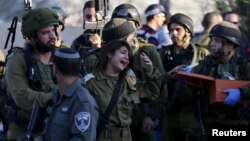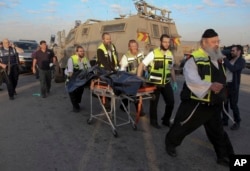A Palestinian attacker stabbed two Israelis at a gas station on the edge of the West Bank on Monday, killing one of them before being shot dead, the Israeli army said. The incident has prompted new security measures announced by Israel's prime minister.
The killing follows a separate attack earlier in the day, when Israeli police shot dead a Palestinian teenager and wounded a second teen girl Monday in Jerusalem after they stabbed a man with scissors.
The victim in the attack was a 70-year-old Palestinian the teens apparently mistook for an Israeli.
The violence is the latest in a months-long wave that included a series of attacks Sunday in the Israeli-occupied West Bank.
Israeli Prime Minister Benjamin Netanyahu announced tighter controls on Palestinian vehicles in the West Bank and an increase in the number of so-called "bypass roads" which create separate routes for Palestinians and Israeli settlers.
The eight-week surge in street violence has challenged Israel's security system and alarmed the United States, whose Secretary of State John Kerry is visiting the region this week.
In one incident Sunday, the military said a Palestinian stabbed a 21-year-old woman multiple times in the head and chest before nearby soldiers shot him dead.
In an earlier attack, the military said a woman pulled out a knife at a military base entrance and began approaching civilians. A local West Bank settler said he veered his vehicle off the road and struck the woman. A soldier then fired at her and killed her.
Wave of violence
During the past two months, 83 Palestinians have been killed, some while carrying out attacks and others in clashes with Israeli forces, while 19 Israelis and an American student have been killed in Palestinian stabbings, shootings and car rammings.
The wave of violence began over tensions surrounding a sensitive Jerusalem holy site and has since spread across Israel, the West Bank and the Gaza border.
Israel says the current violence is due to a Palestinian campaign of lies and incitement surrounding the holy site, which is revered by Muslims and Jews. The Palestinians say the violence is rooted in frustration over nearly a half-century of occupation and they accuse Israel of using excessive force to suppress the unrest.
Kerry's visit
Kerry began his Nov. 22-24 Middle East visit in Abu Dhabi, after which he is scheduled to travel to Israel and the Palestinian territories.
A senior U.S. official said Kerry would discuss ways of trying to stem the violence but would not try to renew negotiations on a state that Palestinians seek in territories Israel captured in the 1967 Middle East war.







